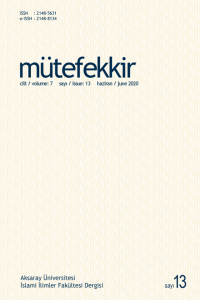Öz
Sûfiler tanrı ve insan arasındaki ilişkiye dair tüm meseleleri, “süreklilik” ve “doğrudanlık” esasından hareketle izah etmeye çalışmışlardır. Bundandır ki Sûfiler Allah’ın kullarına hitabı olan vahyin, Hz. Peygamber’in vefatıyla sona ermiş olduğu kanaatine mukabil sûfiler “velâyet” teorisini geliştirerek vahyin nübüvvetten sonraki formu saydıkları “hikmet”in kesilmezliğini ve insanların peygamberlerin tavassutu olmadan da Allah ile doğrudan ve özel bir bağ kurabileceklerini savunmuşlardır. İnsanın mahiyeti ve tekamülüne ilişkin tahlillerin merkezine yerleştirilen bu teori aracılığıyla sûfiler, ezelî hikmet olan Kur'ân-ı Kerîm’in sonsuz anlam katmanlarına veya hakikatin bilgisine her zaman için; ama yalnızca “seçilmiş olanlar” tarafından vakıf olunabileceği iddiasını gündeme getirmektedirler. Dolayısıyla Allah’ın ezelde seçtiği kişilere yani velîlerine hasrettiği makam olarak velâyet, insanın epistemik anlamda ulaşabileceği en nihai mertebenin ne olabileceği sorusuna tasavvuf kanadından gelen bir cevap olarak görülebilir. Bu makale de çoğu zaman Hakim Tirmizî’nin Hatmü’l-Evliyâ isimli eseri üzerinden yürütülen velâyet teorisine ilişkin modern araştırmaların sarf-ı nazar ettiği Tirmizî öncesi sufilerden Cüneyd-i Bağdâdî’nin görüşlerini ortaya koyarak, velayet araştırmalarındaki odak alanını genişletmeyi amaçlamaktadır.
Anahtar Kelimeler
Öz
Sufis have tried to explain all the issues of the relationship between God and man on the basis of “continuity” and “directness”. In response to the belief that the revelation ended with the prophet’s death, sufis developed the theory of “walāya/sainthood” and defended the continuation of the “wisdom” which they saw as the next form of revelation after the prophethood, and the belief that people could establish a direct and special bond with Allah even without the prophets' interventions. Through this theory placed at the center of the discussions about human nature and its spiritual development, sufis raised the claim that the endless layers of meaning of the Qur'an and the knowledge of truth is always but only by the “selected ones” knowable. Therefore, walāya can be seen as an answer from the sufi wing to the question of what might be the ultimate level achieved by man in the epistemic sense. This article aims to expand the focal point of sainthood researches which concentrate on Khatm al-awliyāʾ of al-Tirmidhī and ignore the thoughts of pre- Tirmidhī sufis, by revealing the views of Junayd al-Baghdādi.
Anahtar Kelimeler
Sufism Sainthood Junayd al-Baghdādi Tirmidhī Divine Election
Ayrıntılar
| Birincil Dil | Türkçe |
|---|---|
| Konular | Din Araştırmaları |
| Bölüm | Çeviri |
| Yazarlar | |
| Çevirmenler | |
| Yayımlanma Tarihi | 30 Haziran 2020 |
| Gönderilme Tarihi | 22 Nisan 2020 |
| Yayımlandığı Sayı | Yıl 2020 Cilt: 7 Sayı: 13 |
Cited By
Aksaray Üniversitesi İslami İlimler Fakültesi dergisi Mütefekkir, her yılın 15 Haziran ve 15 Aralık tarihlerinde olmak üzere basılı ve online olarak yayınlanan, uluslararası akademik ve hakemli bir dergidir.


